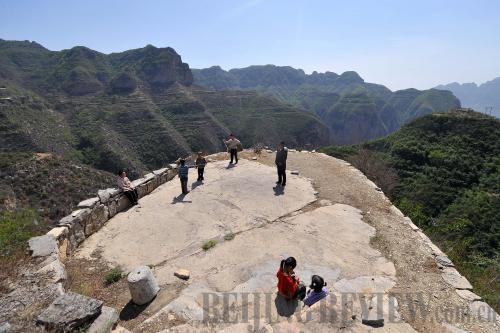|
 |
|
HIGH SCHOOL: Yuan Zichao, a teacher at Xichan Primary School in Pingshun County, Shaanxi Province, supervises the only six students of the mountaintop scool on their "playground" at a 1,400-meter altitude on May 15, 2012 (ZHAN YAN) |
According to Yuan, due to imbalanced economic development and uneven distribution of educational resources, students in developed regions have better chances of attending college than students from poorer regions.
Since the 1990s, the proportion of rural students in China's universities has been dropping steadily. The percentage at Peking University had fallen from 30 percent to 10 percent, while at Tsinghua University rural students made up only 17 percent of the student body in spite of accounting for 62 percent of entrance exam takers, according to research by the two universities in 2011.
Peking University surveyed Beijing, Shanghai and Guangdong Province in 2009, revealing that only 0.7 percent of the 2,732 rural respondents had university degrees or higher, as opposed to 13.6 percent among the 3,253 urbanites polled.
Chu Zhaohui, a senior researcher at the National Institute of Education Sciences, also acknowledged the low proportion of rural students attending top universities in recent years.
"This unfair situation is partly rooted in the massive differences in basic education between rural and urban areas," Chu claimed.
For instance, he suggests the government increase teaching salaries, because good teachers in rural areas are few and far between.
In 2009, Wang Pengwei and Si Xiaohong, professors at Shaanxi Normal University, conducted a survey among over 360,000 teachers at primary and middle schools in the province and found that only 42 percent of teachers in rural areas held a bachelor's degree, while the proportion for urban teachers was closer to 74 percent.
At the February 26 MOE press conference, Xu Tao, an official in charge of teacher management, said that 90 percent of teachers assigned to underdeveloped rural areas have chosen to keep their posts after the expiration of their contracts. Xu said the Central Government has raised the teachers' salaries and allowed them to pursue master's degrees while working.
During a tour of southwest China's Yunnan and Guizhou provinces in late March, Vice Premier Liu Yandong stressed the role of rural education, which she said should serve as "a solid foundation for the growth of millions of rural children." Liu said that the construction of boarding schools should be strengthened and weak schools should be assisted to improve teaching levels. Rural teachers' training should be strengthened and their salaries and subsidies should be increased so that more outstanding teachers will be willing to continue working in the countryside, the vice premier said.
On May 15, the State Council released a statement promising the government will offer more opportunities for higher education to hard-working students in rural areas.
Last April, the MOE announced that 10,000 seats in prestigious universities would be reserved for students from least-developed areas in the five years from 2012. The government decided to increase the quota to 30,000 this year. The additional students would mostly come from central and western regions, where colleges are scarce and competition for placement is fierce, according to the statement.
Li Chang'an, a professor on public policy at the Beijing-based University of International Business and Economics, said that long-term effort on access to education is needed.
"One day, when the country can fairly distribute educational resources among all students and regions, equality in education will be easier to achieve."
Email us at: yinpumin@bjreview.com | 